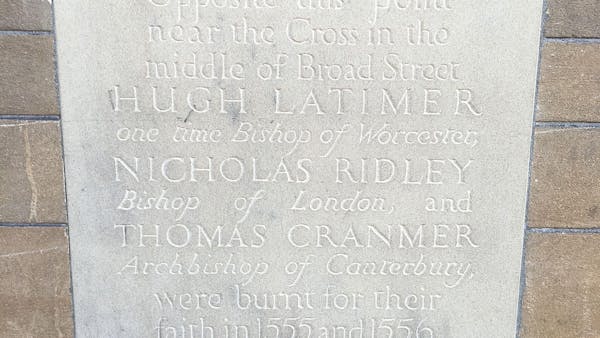When Edward VI died in 1553 England was thrown into terrible religiopolitical strife. In a bid to keep the Pope from indirectly gaining control of the throne of England, Lady Jane Grey was made Queen but she only ruled for 9 days being deposed by Edward’s sister Mary Tudor. Despite her initial platitudes it soon became clear that Mary’s intentions were to make England a Catholic nation. Mary ordered Latimer’s arrest and when word reached him that his captors were on their way he chose to surrender himself peacefully rather than escape. While in prison he met Nicholas Ridley, Bishop of London and Thomas Cranmer, Archbishop of Canterbury.
In March of 1554 they were all tried for heresy at Oxford where Latimer and Ridley were both sentenced to death and on the 16th of October 1555 were led to the place of execution outside Balliol College Oxford, where Wycliffe, the harbinger of reform, had preached a century before.
Sharing an embrace before execution Ridley said to Latimer “‘Be of good cheer, brother, for God will either assuage the fury of the flames or else strengthen us to abide it.’ to which Latimer responded, ‘Be of good comfort Master Ridley and play the man. We shall this day, by God’s grace, light a candle in England as I trust in God shall never be put out.’
The impact of their martyrdom served to turn the tide of popular opinion against Catholicism in England. The country was appalled at a religion that would resort to such brutal methods to promulgate itself.
Ridley’s parting words to Latimer ring true in my ears. Whenever we face trials in our lives it’s good to remember that God will either assuage the fury of the flames or else strengthen us to abide them. May our affections be so firmly fixed in the right place and on the right Person that we may look the hardest trials squarely in the eyes and not be moved.

